 After his outstanding debut “American Life” in 2015, this must be that difficult second album for Ed Dupas. However difficult its conception (and it sounds like there were a few painful moments), the end result is a fulfilling follow-up to his debut. It’s a progression of course; at times Ed puts his acoustic to one side to add a second over-driven electric to the guitar attack, creating a big widescreen sound that brings to mind early Bruce Hornsby and maybe even “Darkness”-era Springsteen.
After his outstanding debut “American Life” in 2015, this must be that difficult second album for Ed Dupas. However difficult its conception (and it sounds like there were a few painful moments), the end result is a fulfilling follow-up to his debut. It’s a progression of course; at times Ed puts his acoustic to one side to add a second over-driven electric to the guitar attack, creating a big widescreen sound that brings to mind early Bruce Hornsby and maybe even “Darkness”-era Springsteen.
And that’s the way the album opens; “Too Big to Fail” is a rocker packed with big, loud guitars delivering Ed’s perfectly crafted song. His lyrics are clever and subtle, combining the “too big to fail” business/sports franchise mantra with subtle allusions to the state of contemporary America; it doesn’t matter how bad things are, ‘love’s too big to fail’. I really hope so. The album’s second song, “Two Wrongs”, continues the two guitar attack with lyrics seamlessly interweaving the increasing isolation of rural America with a short-term, unwise, dalliance; real life might look simple on the surface, but it’s usually messy underneath.
The remainder of the album mixes country and rock stylings to great effect, combining the two perfectly in the title track, which takes up the themes of “The Wild Side of Life” and “Bright Lights, Big City” while giving the story a happy ending (well, maybe). The album’s closer “Hold Me Tight” has echoes of Bob Seger’s acoustic side (well, Ed is based in Ann Arbor) and neatly finishes the journey from the opening rockers to the closing mixture of regret and nostalgia.
I’m rapidly becoming a big fan of Ed Dupas; the delivery is impossible to fault and his songs are superbly crafted with the emphasis on subtle allusion rather than declamation. It’s difficult not to admire a songwriter that trusts his audience to think and interpret for itself and put in a little effort to appreciate the songs.
While I’ve got your attention, I’d just like to point you in the direction of a song from Ed’s 2015 debut album. “Flag” is a beautiful example of the songwriter’s craft and would move the hardest heart. Give it a listen and tell me I’m wrong. Now how about some UK appearances, Ed?
“Tennessee Night” is released in the UK on Friday July 28 on Road Trip Songs.
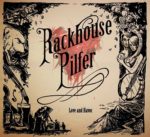 ‘Why don’t we open the album with a song about busting out of prison, I mean it worked for Thin Lizzy, didn’t it?”. Well, it certainly did and just as “Jailbreak” set the tone perfectly for the album of the same name, “Dust on the Road” does the same for Rackhouse Pilfer’s “Love and Havoc”. The frenetic banjo and fiddle interplay drives along a tale of freedom or death that’s only resolved with the half-speed coda signifying success. By the end of the song, you know you’re in good hands. Rackhouse Pilfer is an Irish six-piece outfit and, if I can’t use the catch-all term Americana, I’d have to say they play original songs influenced by country, bluegrass and a hefty dose of seventies Laurel Canyon troubadours and another hefty dose of homegrown Irish fun. If you can carry that off, you’ve got something a little bit special and they don’t just carry it off, they heave it into the air and juggle it with one hand. OK, I admit it, we’re a bit behind the curve on this one; it was released in 2014 but it’s just popped up in the Riot Towers inbox ahead of a Rackhouse Pilfer UK tour.
‘Why don’t we open the album with a song about busting out of prison, I mean it worked for Thin Lizzy, didn’t it?”. Well, it certainly did and just as “Jailbreak” set the tone perfectly for the album of the same name, “Dust on the Road” does the same for Rackhouse Pilfer’s “Love and Havoc”. The frenetic banjo and fiddle interplay drives along a tale of freedom or death that’s only resolved with the half-speed coda signifying success. By the end of the song, you know you’re in good hands. Rackhouse Pilfer is an Irish six-piece outfit and, if I can’t use the catch-all term Americana, I’d have to say they play original songs influenced by country, bluegrass and a hefty dose of seventies Laurel Canyon troubadours and another hefty dose of homegrown Irish fun. If you can carry that off, you’ve got something a little bit special and they don’t just carry it off, they heave it into the air and juggle it with one hand. OK, I admit it, we’re a bit behind the curve on this one; it was released in 2014 but it’s just popped up in the Riot Towers inbox ahead of a Rackhouse Pilfer UK tour.
“Another Dirty Joke” rattles along in the same light-hearted way with a theme of drunken and stoned escapism, but it’s not just about the craic; there’s a serious side to the album as well. “Me and a Polar Bear” is an uptempo piece with an environmental theme while “Angela” tells the story of a woman who wants to escape a relationship by murdering her partner. You can hear more traditional string band influences on the slow “A Sailing Song” with its mournful unison fiddle and mandolin and the rollicking “Shady Grove”, which gives all of the players a chance to show off their skills with short solos.
And the Laurel Canyon influence? Well “Two Oceans” evokes early Jackson Browne perfectly; the song, the vocal and even the title could have featured on any of his first three albums. You can hear an Eagles influence in the harmony-laden midtempo country-rock of “Calico Sky” and “I’ll Find a Way” (maybe a hint of Bob Seger’s “Against the Wind” in there as well) and “Bright Lights” could be Bernie Leadon era Eagles.
“Love and Havoc” assimilates a huge number of influences, weaves them into a bunch of diverse and memorable songs and tops the mix off with a touch of Celtic good humour. And I’m willing to bet they do a cracking live show, so maybe you should look out for dates near you on their UK tour.
“Love and Havoc” is out now.
![photo[1]](http://musicriot.co.uk/wp-content/uploads/2017/01/photo1-150x150.jpg) Let’s just say that my preconceptions have been well and truly shaken up. Two songs in to the latest offering from Wille & the Bandits, and I was on the verge of filing it under ‘generic Southern rock/slide guitar’, but we don’t give up that easily at Riot Towers. Actually, there’s nothing wrong with the slide and Hammond (courtesy of Don Airey) of “Miles Away” or the Dire Straits meets Pink Floyd of “Hot Rocks”, with its congadelic breakdown, but they have the feel of a starter before the main course, “Scared of the Sun”, which brings all of the elements at the band’s disposal into play.
Let’s just say that my preconceptions have been well and truly shaken up. Two songs in to the latest offering from Wille & the Bandits, and I was on the verge of filing it under ‘generic Southern rock/slide guitar’, but we don’t give up that easily at Riot Towers. Actually, there’s nothing wrong with the slide and Hammond (courtesy of Don Airey) of “Miles Away” or the Dire Straits meets Pink Floyd of “Hot Rocks”, with its congadelic breakdown, but they have the feel of a starter before the main course, “Scared of the Sun”, which brings all of the elements at the band’s disposal into play.
The dynamics are perfect, from the quiet intro with gentle keys and to the full-on anthemic chorus. We hear the full range of Matt Brooks’ six-string bass, particularly at the upper end of the register acting as a second guitar part, Andy Naumann’s drums power the verse and chorus along and Don Airey adds some Vangelis-like like sounds to the mix. Meanwhile Wille Edwards is doing his guitar thing (ok, things with electric, acoustic, lap steel, Weissenborn and Dobro) and delivering a vocal that’s as close to very early Bob Seger as anything I’ve ever heard. And here’s the real surprise; it’s a song about global warming. I’m not an expert on Southern ‘rawk’, but I’m guessing that environmental concerns aren’t high on the list of lyrical topics. It’s probably quite a way behind highways, Harleys, guns and Saturday night.
The instrumental inspiration for the album is the American south in the seventies, so the song “1970” should come as no surprise; driven along by drums and a pumping bass, it mourns the passing of that era while extolling its virtues (‘Good times, love and peace’) in a seventies rock style. If the environmental concern wasn’t enough of a shock, there’s a song written from the point of view of a refugee from a war-ravaged country. “Crossfire Memories” begins with quiet acoustic guitar and builds through the addition of a Matt Brooks string arrangement and slide fills to a big slide solo to close out the song; it’s powerful stuff.
The playing is every bit as good as you would expect from the people involved in this album, and it’s worth listening to for that alone, while the presence of some lyrical content that steps out of the usual limits of the genre gives it an undeniable edge. I have a sneaky feeling these guys will sound even better live.
“Steal” is released on Friday January 20th on Jigsaw (SAW 6).
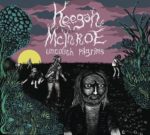 “Uncouth Pilgrims”: the title’s a quotation from Mark Twain’s travelogue, “The Innocents Abroad”. It’s Keegan McInroe’s fourth solo album and it pulls together various strands of Americana, weaving them together with (mainly) stories of Keegan’s own musical pilgrimage around the world. He succeeds in uniting some diverse styles with his travelling minstrel theme and honest lyrics that shift easily from gentle and pastoral to the raw and urban. It’s difficult to pin him down to a single genre as the album shifts from the Nashville country of the openers, “Country Music Outlaw” and “Tonight” through the boogie of “Lumberjack”, the raw electric blues of “Uncouth Pilgrim” and the folk of “Woody and Ruth”.
“Uncouth Pilgrims”: the title’s a quotation from Mark Twain’s travelogue, “The Innocents Abroad”. It’s Keegan McInroe’s fourth solo album and it pulls together various strands of Americana, weaving them together with (mainly) stories of Keegan’s own musical pilgrimage around the world. He succeeds in uniting some diverse styles with his travelling minstrel theme and honest lyrics that shift easily from gentle and pastoral to the raw and urban. It’s difficult to pin him down to a single genre as the album shifts from the Nashville country of the openers, “Country Music Outlaw” and “Tonight” through the boogie of “Lumberjack”, the raw electric blues of “Uncouth Pilgrim” and the folk of “Woody and Ruth”.
There’s no doubt about the quality of his voice. He goes all the way from the growling early Bob Seger feel of “Uncouth Pilgrim” to the quiet and close-miked “Verona” and “Resolutions” and he sounds completely convincing all the way, backed by musicians that always sound assured but never flashy. This is all about the voice and the songs, but it helps that the arrangements and the musicians create a backdrop that works superbly whether it’s a full band or just a couple of instruments.
The songs are very much lyric-driven, a wanderer’s tales of hangovers, romantic opportunities missed and lustful opportunities taken across several continents. Virtually everything on the album sounds autobiographical, apart from the folk ballad “Woody and Ruth” which surely has to be a Woody Guthrie story and, with Woody’s reputation, who knows whether it’s true or false. It’s a very sparse arrangement built around simple guitar and drum parts with a very laconic vocal, but it works beautifully, connecting Woody’s journeys around America with the modern troubadour’s journeys around the world. And it’s not just about quality, the album weighs in at a hefty fourteen songs, so no-one’s going to feel short-changed.
The album’s a fine piece of work, pulling together Keegan’s roots in various forms of American music to create an evocative musical picture of the life of ‘Just another shaggy singer of songs’. It’s also a shoo-in for the ‘Most Cities and Countries Mentioned on One Album’ category at the next AMA UK awards.
“Uncouth Pilgrims” is released on Friday May 27th and you can get a CD copy here.
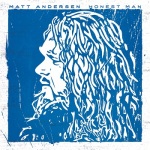 You barely make it past the intro of the album’s opener, “Break Away”, before it hits you; Matt Andersen has a phenomenal voice. It’s a rich baritone from the same mould as the great Paul Carrack and it’s the perfect vehicle for this set of songs harking back to the glory days of Stax and Atlantic. Matt’s previous work has been filed under blues, but there’s no doubt at all that this is a soul album (with a few detours into reggae rhythms and a hint of seventies rock). The album has a lot in common with last year’s Southside Johnny classic “Soultime!” in that they’re both inspired by the glory days of sweet soul music; you can find little references to all sorts of artists and styles throughout the album, but it’s ultimately held together by that superb voice.
You barely make it past the intro of the album’s opener, “Break Away”, before it hits you; Matt Andersen has a phenomenal voice. It’s a rich baritone from the same mould as the great Paul Carrack and it’s the perfect vehicle for this set of songs harking back to the glory days of Stax and Atlantic. Matt’s previous work has been filed under blues, but there’s no doubt at all that this is a soul album (with a few detours into reggae rhythms and a hint of seventies rock). The album has a lot in common with last year’s Southside Johnny classic “Soultime!” in that they’re both inspired by the glory days of sweet soul music; you can find little references to all sorts of artists and styles throughout the album, but it’s ultimately held together by that superb voice.
The album opens with the Hammond-led gentle reggae feel of “Break Away” which hints at “Graceland”-era Paul Simon and The Staples’ “Come Go with Me”, moves into the slow and subtle soul of “The Gift” with its beautiful cascading guitar before the title track throws a whole bunch of influences into the blender. “Honest Man” opens with a riff that’s not a million miles from “Crossroads”, develops with some Memphis Horns-style brass (including the trademark rasping baritone sax) and drops into a chorus with backing vocals which could have been inspired by Don Henley’s scathing “Dirty Laundry”.
So, you get the picture; the album pulls dozens of influences into the blend without ever sounding derivative. “All the Way”, with its hint of a reggae beat, languorous vocal and wah-wah guitar has a hint of seventies Clapton, “Last Surrender” has echoes of Sam Cooke and “Who Are You Listening To?” suggests late seventies Bob Seger, both musically and lyrically. It’s a celebration of some of the classic stylings from our musical history combined with a bunch of well-constructed contemporary songs.
There are a few political and social references, but the songs cover a variety of lyrical themes including love and friendship. “I’m Giving In” is a haunting piano ballad with an intimate, late night vocal while the album’s closer, “One Good Song”, describes the things that a songwriter would suffer to create the one song that makes an audience stop and listen. It’s fair to say that he’s done that a couple of times on this album with the title track and “Last Surrender”. “Honest Man” is a joyous piece of work placing a superb soul voice in settings which demonstrate its quality to perfect effect.
“Honest Man” is released on True North Records (TND612) on April 1st.
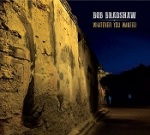 Bob Bradshaw’s sixth album, “Whatever you Wanted” is a collection of songs inspired by the musical styles he’s been exploring in his adopted country, America, taking a leisurely stroll through various styles and adopting arrangements and textures from new country, old country, roots, and tex-mex along the way. The instrumentation on the album covers a wide range, from the reined-in acoustic, electric and strings of the opening song “The Start of Nothin’” (not sure that I would want to open an album with that particular message) to the old soul vibe of “Before” with horns, Hammond and strings creating a lush background for the laconic vocal. The arrangements all have a very light touch, and “Before” still seems to have lots of space even with trumpet, flugelhorn, trombone and strings adding spice to the percussion, bass, guitars and keys.
Bob Bradshaw’s sixth album, “Whatever you Wanted” is a collection of songs inspired by the musical styles he’s been exploring in his adopted country, America, taking a leisurely stroll through various styles and adopting arrangements and textures from new country, old country, roots, and tex-mex along the way. The instrumentation on the album covers a wide range, from the reined-in acoustic, electric and strings of the opening song “The Start of Nothin’” (not sure that I would want to open an album with that particular message) to the old soul vibe of “Before” with horns, Hammond and strings creating a lush background for the laconic vocal. The arrangements all have a very light touch, and “Before” still seems to have lots of space even with trumpet, flugelhorn, trombone and strings adding spice to the percussion, bass, guitars and keys.
The songs are all well-crafted and very listenable, but Bob Bradshaw’s voice is the real selling point for the album; it’s warm and soulful and the close-miking creates a very intimate feel that shifts seamlessly from the silky, Chris Izaak-like “Crazy Heart” to the Bob Seger feel of the album’s perfect closing track, “The Long Ride Home”. The lyrical themes shift from the opening song’s nostalgia, through several breakup songs (including the title track and the album’s most raucous song, the swamp rock of “Losing You”), introspection (“Dream” and “High”) and the allegorical “Sparrow”, which has more than a hint of “Norwegian Wood”.
It’s certainly not a chore to listen to “Whatever you Wanted”, but, for me, everything fits into place on the album’s final song. “The Long Ride Home” is a superb little vignette, evoking perfectly the band on the road leaving the scene of the crime. The backdrop is minimal with only piano, guitar and lap steel supporting Bob Bradshaw’s laconic, world-weary, end-of-a-long-day vocal and the Bob Seger comparison’s difficult to resist, the theme bring the same as Seger’s road classic “Turn the Page”.
As a whole, the album suffers a little from the Bob Bradshaw’s eclecticism; every time you think you’ve got a grip on it, a new style comes along and it slips out of your grasp. There’s nothing you wouldn’t want to listen to again, but it never quite seems to hang together and it feels like you want the band and Bob to really cut loose and rock out a little. After the first eleven tracks, it’s a very solid three-star album, but the final song ensures that the album creates a haunting impression that fixes it in the memory.
“Whatever you Wanted” is out on Friday November 13th on Fluke Records.
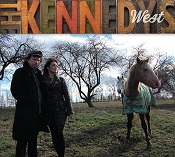 It’s great to see that after twenty years together, Pete and Maura Kennedy are celebrating by releasing three albums in 2015, following the live Nanci Griffith set and Pete’s solo instrumental album last year. I can’t think of a more compact, complete and self-sufficient creative partnership than Pete and Maura. As live performers, they both sing beautifully, with Maura generally leading while Pete supplies perfect harmonies. Instrumentally, Maura provides the rhythm guitar backdrop while Pete plays lead lines to complement the songs and occasionally gets the chance to demonstrate his mastery of guitar and several more (mainly) stringed instruments. They’re both fine songwriters together and individually who aren’t afraid to include songs by other writers with their own material. This might all sound a bit general, but all of this applies to the duo’s latest studio album, “West”.
It’s great to see that after twenty years together, Pete and Maura Kennedy are celebrating by releasing three albums in 2015, following the live Nanci Griffith set and Pete’s solo instrumental album last year. I can’t think of a more compact, complete and self-sufficient creative partnership than Pete and Maura. As live performers, they both sing beautifully, with Maura generally leading while Pete supplies perfect harmonies. Instrumentally, Maura provides the rhythm guitar backdrop while Pete plays lead lines to complement the songs and occasionally gets the chance to demonstrate his mastery of guitar and several more (mainly) stringed instruments. They’re both fine songwriters together and individually who aren’t afraid to include songs by other writers with their own material. This might all sound a bit general, but all of this applies to the duo’s latest studio album, “West”.
The eponymous opener, “West”, is a mid-tempo country rock exploration of a theme which dates back to eighteenth century, moving west as voyage of discovery. It just happens to have the most insanely catchy one-word chorus you’re ever likely to hear. As openers go, a road song with the perfect chorus is a pretty good start. “Elegy”, the second song in, is a folk-tinged celebration of the work of American folk singer-songwriter Dave Carter featuring banjo, mandolin, and even dulcimer from Pete. “Sisters of the Road” is a celebration (that word again) of the female voice and the bond between the sisterhood of performers who criss-cross the USA (and the rest of the world) meeting up whenever their schedules happen to coincide. “Signs” has a very 60s psychedelic folk feel with some electric sitar from Pete and a lyric inspired by a week spent by Maura in the New England woods. The mid-tempo country feel of “Jubilee Time” features a lead vocal from Pete and the uplifting message that however bad things are , they can always get better: ‘And when you’re standing with your hat filled with rain, Just remember that we will meet again’. And this may just say more about my record collection than anything else, but it reminds me a lot of Bob Seger’s “Fire Lake”.
From the opening low-register guitar intro, it’s obvious that “Locket” is inspired by Buddy Holly. It’s musically very simple, and lyrically it’s built around a metaphor of a locket representing a heart; simple but hugely effective. It also alludes to the genesis of Pete and Maura’s relationship twenty years ago, but that’s another story. “Southern Jumbo” returns to a country style, pulling together the themes of a family get-together for cooking and singing and a love song to a guitar and, again, it works perfectly. “Black Snake, White Snake” is a supernatural story of two sister snakes (one bad, one good) based on a piece by poet B.D. Love (who has also been collaborating with Maura on an upcoming album) with Pete’s sitar adding a psychedelic sound which emphasises the sinister tone of the piece.
“Bodhisattva Blues” is a flat-picked country blues pulling together concepts from Eastern and western religions sung in two-part harmony throughout and it’s great acoustic fun, while “Travel Day Blues” moves firmly into electric twelve-bar blues territory combining the legend of the Comte de Saint Germain with a list of some of the distractions that help to pass the hours spent moving from gig to gig. There’s also a nod in the direction of “Subterranean Homesick Blues” and proof that all Chuck’s children are still out there playing his licks. “The Queen of Hollywood High” is a tribute to a Kennedys favourite, the late John Stewart. It’s perfect West Coast pop and Pete and Maura are also helped out here by John’s former band members.
If you know anything about The Kennedys, you probably know that they are Byrds fans, so it should be no surprise that John Wicks of The Records wrote a song for (and about) them, “Perfect Love”, which they perform here. It’s a lovely song and works really well with Pete and Maura’s voices. And what better way to end the album with a twentieth anniversary love song from Pete to Maura with Everlys-style harmonies? “Good, Better, Best” isn’t a song about everything always being perfect, but about how the right person helps you deal with the inevitable bad times.
“West” is a gem of an album; thirteen varied and beautifully-crafted songs played and sung with taste and sensitivity by two very gifted people. There aren’t any instrumental or vocal pyrotechnics, just proper playing and singing; there isn’t anything here that isn’t absolutely necessary. Besides the themes of love, celebration and remembrance, there’s a bit of the supernatural and a light-hearted look at religious enlightenment and fulfilment; I haven’t heard a better album in a long time.
The album is self-released on May 13th 2015, but Pete and Maura will be happy to sell you a copy at any of the following tour dates in the UK:
April
Thurs 30 Glasgow Woodend Bowling & Lawn Tennis Club
May
Friday 1 Basingstoke, The Forge at The Anvil
Sunday 3 Birmingham, Kitchen Garden Café
Wednesday 6 Southport, Grateful Fred’s at The Atkinson
Thursday 7 Milton Keynes, The Stables
Friday 8 London, Kings Place
Saturday 9 Leeds, Seven Arts
Sunday 10 Haile, Cumbria Haile Village Hall.
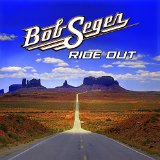 There’s one thing you can say about a Bob Seger album; you know what you’re going to get. What you get is Bob’s gravelly, lived-in voice, a couple of out-and-out rockers, probably a couple of ballads, a couple of mid-tempo anthems, a cover or two (carefully chosen to sound like they could have been written by Bob himself) and maybe something a little bit funky as well. You would expect nostalgic and maybe wistful lyrics about growing up in the Midwest in the sixties, or life on the road and fairly standard rock arrangements spritzed up by a bit of sax and maybe some tasteful Bill Payne piano. So you would expect what is probably his final studio album to be a bit more of the same, and you would be perfectly happy at that.
There’s one thing you can say about a Bob Seger album; you know what you’re going to get. What you get is Bob’s gravelly, lived-in voice, a couple of out-and-out rockers, probably a couple of ballads, a couple of mid-tempo anthems, a cover or two (carefully chosen to sound like they could have been written by Bob himself) and maybe something a little bit funky as well. You would expect nostalgic and maybe wistful lyrics about growing up in the Midwest in the sixties, or life on the road and fairly standard rock arrangements spritzed up by a bit of sax and maybe some tasteful Bill Payne piano. So you would expect what is probably his final studio album to be a bit more of the same, and you would be perfectly happy at that.
Well, “Ride Out” looks like a Bob Seger album and from the opening track, John Hiatt’s “Detroit Made”, it sounds like a Bob Seger album. He’s always been keen on a good rocker to start the proceedings; “Get out of Denver”, “Rock and Roll never Forgets” and “Hollywood Nights” are all opening tracks on “Seven”, Night Moves” and “Stranger in Town” respectively and his romp through Hiatt’s song is right in the comfort zone. “Hey Gipsy” is a straight Chicago blues with guitar and bass playing in unison; it’s a bit of fun but it’s a bit of a departure because, despite the blues influences, you don’t often hear a straight blues on a Bob Seger album.
The cover of Steve Earle’s “The Devil’s Right Hand” is where things start to move out of established Seger territory. It has an Americana/roots feel with some lovely 12-string guitar and Earle’s use of half-line repetitions lends the song a very traditional feel. Bob has had a reputation for solidarity with blue–collar workers in the past but has usually avoided overt political lyrics (certainly during his peak period), so “Ride Out” comes as a surprise with its stabs at the media, high finance and politicians, over a chugging beat punctuated by discordant four-piece horn fills. What comes next is a real surprise; it’s a cover of Australian country stars Shane Nicholson and Kasey Chambers’ “Adam and Eve”; the arrangement is pure dustbowl country with banjo, mandolin, harmonium and fiddle backing Bob and Laura Creamer’s vocal duet. It’s raw, earthy and powerful and the harmonies are superb.
If you’re not already surprised and confused, the next song was written by one of America’s most politicised songwriters; but it’s a Woody Guthrie love song taken from the Wilco/Billy Bragg “Mermaid Avenue” project which was featured on Bob’s 2013 tour. It’s a big production again with violin, Hammond and a horn section and, I know Seger diehards will probably hate this comparison, but it wouldn’t sound out of place on Springsteen’s “We Shall Overcome” album. “”It’s Your World” is another lyrical departure, tackling environmental and financial issues over a sparse piano and guitar-based arrangement; it’s powerful stuff. “All of the Roads” is classic, “Against the Wind”-style Seger, although the violin gives it a more roots feel, creating a nice counterpoint to the Hammond B3. The ballad, “You Take Me In”, a mid-tempo ballad with a fairly traditional Seger arrangement and very upfront vocal would sit perfectly on any Seger album between 1975 and 1995 and sets the scene nicely for a powerful song to close out the album.
And “Gates of Eden” is a powerful song; it’s a slow, almost funereal, revelation of a personal epiphany which builds up with strings, a full rock band and huge backing vocals to a climax before fading out on synth strings. It’s like nothing I’ve ever heard from Bob Seger and it finishes the album as perfectly as a full stop at the end of a sentence. If this is the last album of new Bob Seger material, then “Gates of Eden” is a perfect ending.
The three additional songs on the deluxe edition of the album are all Bob Seger originals. “Listen” and “Let the Rivers Run” are both personal songs, while “The Fireman’s Talkin’” addresses environmental issues again. While I understand the marketing reasons for “Deluxe” editions of albums, in this case it’s an act of vandalism; “Gates of Eden” is clearly intended as a closing song for the album (and perhaps a career) and it’s totally inappropriate to add any songs after that punctuation mark. There’s nothing wrong with the songs, but maybe an additional EP or a download would have worked better.
This is a long way from a comfortable album to keep the fans happy without rocking the boat; this is a set of songs that have the feel of an artist disregarding expectations by using traditional American musical idioms while addressing his concerns about the state of the human race in the twenty-first century before it’s too late. As much as I love Bob Seger’s work, I really wasn’t expecting that; this could be a perfect swansong.
Available on import now.
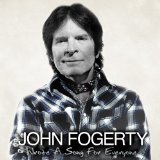 So, what’s this all about then? John Fogerty, former Creedence Clearwater Revival frontman and highly respected solo artist has decided to revisit some of his back catalogue with a few collaborators and throw in a brace of new songs for good measure. It’s not a new idea and it can be either a cynical attempt to cash in on a few good, old songs or a chance to invite fellow musicians to put their stamp on your songs. I’m really pleased to say that “Wrote a Song for Everyone” is a fascinating look at the heritage of one of the great rock songwriters and performers. You have to approach this with an open mind; some of the songs, in their original incarnations, were massive teenage favourites of mine through happy and sad times but there are some radically different interpretations here. The conventional view is that Eagles popularised the country-rock genre, but you could make the same case for Creedence if you take your country influences from New Orleans rather than Bakersfield; just a thought.
So, what’s this all about then? John Fogerty, former Creedence Clearwater Revival frontman and highly respected solo artist has decided to revisit some of his back catalogue with a few collaborators and throw in a brace of new songs for good measure. It’s not a new idea and it can be either a cynical attempt to cash in on a few good, old songs or a chance to invite fellow musicians to put their stamp on your songs. I’m really pleased to say that “Wrote a Song for Everyone” is a fascinating look at the heritage of one of the great rock songwriters and performers. You have to approach this with an open mind; some of the songs, in their original incarnations, were massive teenage favourites of mine through happy and sad times but there are some radically different interpretations here. The conventional view is that Eagles popularised the country-rock genre, but you could make the same case for Creedence if you take your country influences from New Orleans rather than Bakersfield; just a thought.
The album opens with “Fortunate Son”, which is amped-up by the Foo Fighters to a full-on rocker (no surprise there) before Keith Urban delivers a banjo-led country-rock version of “Almost Saturday Night” which takes the song back to its lyrical roots and “Lodi” (probably my favourite John Fogerty song) gets the Status Quo “Rocking All Over the World” treatment with John’s two sons Shane and Tyler Fogerty. Incidentally, this is the only collaboration that Fogerty arranged, pulling rank with his two sons when he didn’t like their country-rock arrangement. “Mystic Highway” is one of the new songs and breaks down into 3 sections, the main song, an instrumental section and an a capella breakdown with a strong feel of the Doobie Brothers “Black Water”. “Wrote a Song for Everyone” features a Miranda Lambert vocal and some exceptional guitar work from Tom Morello; so far so good.
The Zac Brown Band reworking of “Bad Moon Rising” in a Cajun style works less well for me, losing the brooding menace of the original version. “Long as I can See the Light” with My Morning Jacket sticks fairly close to the original, retaining the organ riff which characterises that version and is followed by Kid Rock’s take on “Born on the Bayou”. Apparently it’s now a violation of several federal statutes to record a collaboration album without including a Kid Rock track. The album’s second new song “Train of Fools” follows, exploring similar territory to Springsteen’s recent “Land of Hope and Dreams”. It’s obvious that John Fogerty can still write a good song and the new songs sit very comfortably alongside his earlier work on this album.
“Someday Never Comes” with Dawes has Taylor Goldsmith singing the verses about the things we tell kids (and adults) to shut them up while Fogerty takes the choruses as the gruff old bad guy who tells us that it’s all lies. Bob Seger delivers the Woodstock song “Who’ll Stop the Rain” very much in the style of his 1976 classic “Night Moves”, which works very well. If any singles are to be released from the album, “Hot Rod Heart” should be top of the list. It’s a great driving song (maybe it’s time we had an alternative to the lazy radio programming of Don Henley’s “The Boys of Summer” every time the sun shines for more than five minutes) and the last couple of minutes consists of Fogerty and Brad Paisley trading superb guitar solos and generally having a good time. I bet Paddy McAloon wouldn’t like it.
“Have You Ever Seen the Rain” with Alan Jackson works perfectly with a pure country arrangement with banjo, fiddle and steel guitar filling out the sound and leads us into the last track of the album. I’ve heard many versions of “Proud Mary”, but nothing quite like this. The first verse and chorus are pure gospel with Jennifer Hudson backed by a gospel choir and the wonderful Allen Toussaint before speeding up to a Cajun boogie with the full band and accordion and horns for good measure. I used to think the Ike & Tina Turner version was over the top, but they only used one kitchen sink and I think there’s about three here. It’s a glorious way to end a great album.
John Fogerty has survived in the music business for a long time with all of the usual peaks and troughs that anyone big in the sixties and seventies went through including the publishing disputes, particularly the publishing disputes. The reason he’s still around is that he loves what he does and he’s very good at it. “Wrote a Song for Everyone” is a very, very good album.
Out now on Vanguard (88765487152).


